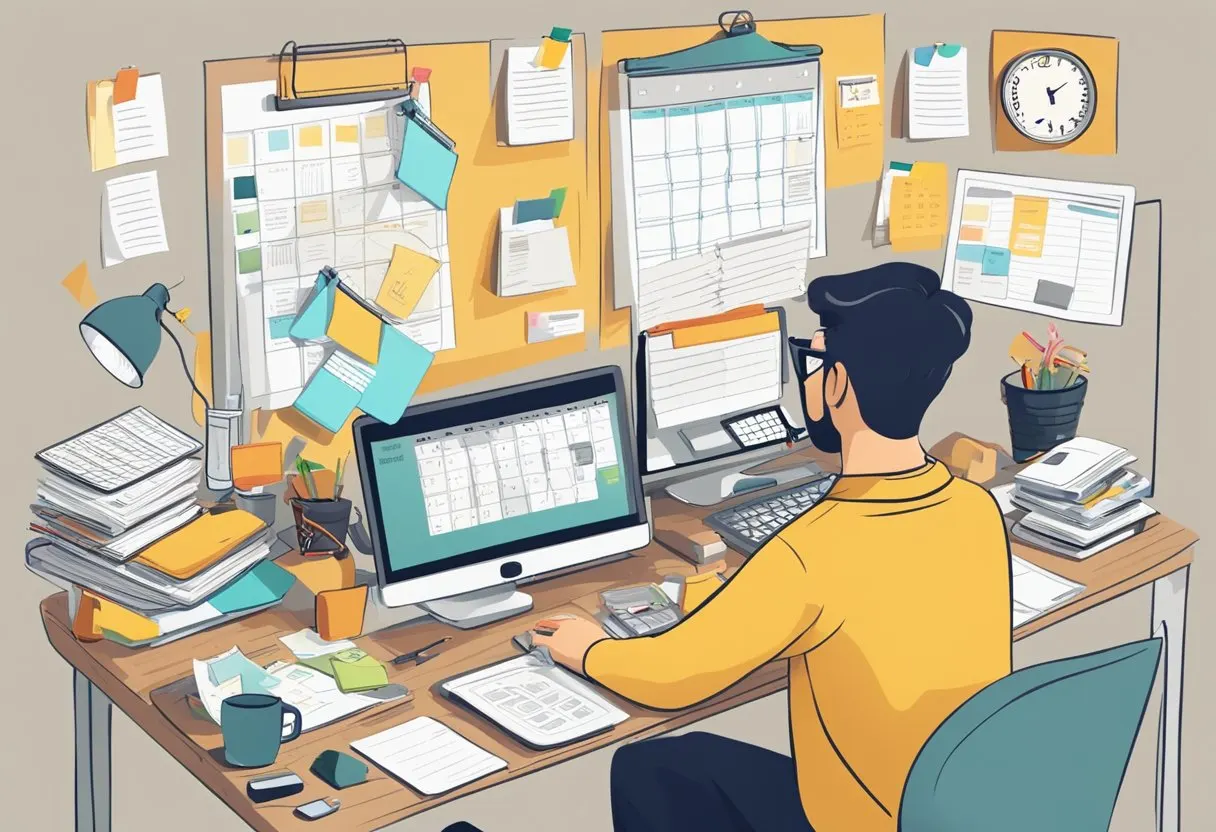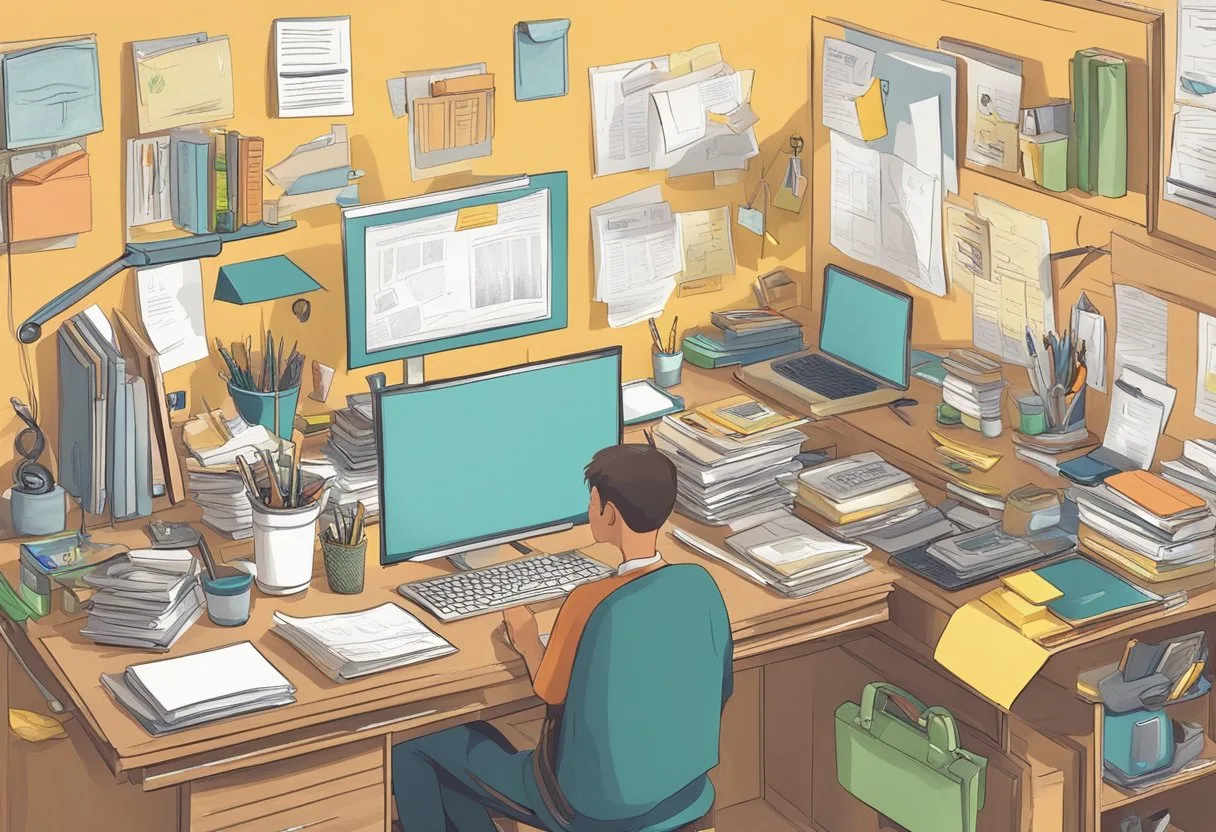For Gen X professionals navigating the complexities of ADHD, balancing career demands while maintaining productivity feels like a daily challenge. Yet, with the right strategies and mindset, enhancing work performance is achievable. Finding practical ways to manage ADHD can significantly boost your productivity, helping you excel in your career.

Understanding ADHD’s impact on your professional life is the first step to overcoming workplace hurdles. Whether it’s managing meetings or tackling large projects, knowing how ADHD affects your focus is crucial. Integrating techniques such as structured breaks and altering your work environment can be transformative. Discovering methods to thrive can have a profound impact on your day-to-day success.
Incorporating tech tools can further aid in maintaining focus. Apps designed to help organize your tasks or send reminders to move can ease stress and help you stay on target. For additional support, consider consulting a therapist who specializes in ADHD to help you develop effective coping strategies tailored to your needs. Learn how to blend these aids with personal techniques to truly enhance your productivity.
Key Takeaways
- Practical strategies can improve your ADHD management.
- Understand how ADHD affects your work life.
- Explore tech tools to support focus and organization.
Understanding Tracy Douglas
Gen X professionals with ADHD face unique challenges in their work and personal lives. Understanding characteristics of ADHD and its impact on productivity, along with improved diagnosis, is crucial for effective management. ADHD therapy for adults has different approaches and various benefits.
Characteristics of ADHD
ADHD in adults often presents as hyperactivity, inattention, and impulsivity. You might find it hard to stay focused on tasks or forget details easily. Executive dysfunction can make it difficult to plan and prioritize. Many Gen X professionals face these symptoms, which may have affected them since childhood. Unlike in children, hyperactivity in adults can manifest as restlessness or feeling constantly on the go. Recognizing these traits can help you better manage them in the workplace. Tracy Douglas is one the therapist dealing with ADHD in adults.
Impact of ADHD on Productivity
ADHD can greatly impact your productivity. Inattention leads to frequent mistakes or unfinished work, while impulsivity might result in hasty decisions. Executive dysfunction makes managing time and organizing tasks a struggle. This can cause stress, reducing your efficiency even more. Understanding these challenges is important to develop strategies to improve focus. Tools or techniques like lists or structured routines can be beneficial in managing productivity despite these challenges. Finding ways to channel energy positively can help overcome hyperactivity.
Diagnosis and Recognition
Adults with undiagnosed ADHD often struggle without understanding the cause. Many Gen X professionals weren’t diagnosed as children, since awareness was lower in the 1970s and 1980s. Fortunately, the recognition of ADHD in adults has grown. If you suspect you have ADHD, seeking a diagnosis can provide valuable insight into your challenges. Consulting a mental health professional can lead to targeted support and effective management strategies. This diagnosis is essential for creating a tailored plan to address symptoms and improve your work-life balance.
ADHD Therapy for Adults
Therapy can be a key part of managing ADHD symptoms in adults. Cognitive Behavioral Therapy (CBT) is a common choice. CBT helps you identify negative thoughts and behaviors, aiming to replace them with more positive ones. It is action-focused and goal-oriented.
Another option is Mindfulness-Based Therapy. This approach teaches you how to be present in the moment, which can improve focus and reduce stress. It often includes meditation exercises, helping you manage racing thoughts and impulsivity.
Group Therapy allows you to connect with others facing similar challenges. Sharing experiences and coping strategies can be empowering. It also provides a support network.
Coaching is another effective tool. An ADHD coach helps you set goals, develop routines, and maintain focus. Completing ADHD life coach training can equip coaches with the skills needed to provide structure and accountability, which many adults with ADHD find useful.
If you’re interested in exploring these therapies, it’s beneficial to learn more about how these approaches work. Consider seeking professional advice and guidance tailored to your specific needs.
Strategies for Enhancing Productivity
Achieving higher productivity with ADHD involves practical approaches in time management, organization, and the smart use of technology. By adopting structured techniques, leveraging tech tools, and prioritizing tasks, you can improve focus and efficiency.
Time Management Techniques
Time management is crucial when navigating ADHD challenges. Start by breaking tasks into smaller, manageable parts. This helps prevent feeling overwhelmed and allows you to manage your time effectively. Setting a timer, known as the Pomodoro technique, can also keep you on track. Work for 25 minutes, then take a 5-minute break.
Creating a daily schedule with specific time slots for tasks can also help maintain focus. Be flexible but stay committed to your plan. Understanding peak productivity hours can ensure you tackle complex tasks when you’re most alert. Consider using a visual timer to provide a tangible sense of time passing.
Organization and Prioritization
Staying organized is essential. Begin by crafting a clear and concise to-do list every day. Sorting tasks by priority can help you focus on what’s most important. Use categories such as urgent, important, and later to order your tasks.
Keeping your workspace clutter-free reduces distractions. Digital tools like note-taking apps can help you store information neatly and retrieve it easily. Practice the “one-touch” rule: when you pick up something, deal with it immediately.
Review your to-do list regularly to adjust priorities as needed. This ensures you’re always working on the most critical tasks.
Leveraging Technology
There are many tech tools specifically designed to help with ADHD-related productivity challenges. Digital calendars can help you plan your days down to the smallest detail. Setting reminders for meetings or deadlines keeps you on track.
Use apps that block distracting sites during work hours to minimize interruptions. Applications like Trello or Asana can help you visually manage tasks and projects. Cloud storage tools allow quick access to documents, streamlining both personal and professional information management.
By utilizing technology, you can simplify your routines, ensuring only essential information gets attention while minimizing digital clutter. This approach can support better focus and task completion.
Managing Distractions and Maintaining Focus

For Gen X professionals with ADHD, managing distractions and maintaining focus involves strategic handling of both external and internal obstacles. Techniques like setting routines and understanding the concept of hyperfocus are essential to achieving productivity.
Dealing with External Distractions
External distractions can come from environmental noise, clutter, or interruptions from colleagues. To minimize these, you might consider creating a dedicated workspace, using noise-canceling headphones, or positioning your desk in a quiet corner.
Breaking tasks into smaller chunks, or task chunking, can make overwhelming tasks seem more manageable. It encourages short bursts of focus with brief breaks in between, preventing fatigue and keeping your mind fresh.
When you’re at work, simple lists or visual timers can help you stay on track. A simple list allows you to check off accomplishments, which boosts motivation. Visual timers create a sense of urgency to complete tasks within a set period.
Managing Internal Distractions
Internal distractions often arise from thoughts or emotions, which can disrupt focus. Mindfulness techniques, such as deep breathing or meditation, can help calm an overactive mind.
Creating a daily routine is crucial for maintaining focus. Setting clear goals each day reduces the chances of wandering attention. Developing a structured schedule helps in managing time blindness, a common issue with ADHD.
Regular breaks also help refresh your concentration. You might try the Pomodoro Technique, which involves focusing for 25 minutes, followed by a 5-minute break. This approach can increase productivity by preventing burnout and maintaining energy levels.
The Role of Hyperfocus
Hyperfocus is a state where you concentrate intensely on an activity, sometimes losing track of time. While it can be beneficial for productivity, it can also lead to neglect of other important tasks. Recognizing when you enter this state is key.
Leveraging hyperfocus requires a balance. Set alarms or reminders to help you switch tasks when necessary. This ensures that you don’t miss out on important commitments or deadlines.
Understanding how hyperfocus works allows you to use it to your advantage while maintaining a broader view of your responsibilities. It’s about channeling that energy into the right tasks to achieve your goals.
Setting and Achieving Goals

Gen X professionals with ADHD can enhance productivity by setting well-defined goals, adhering to deadlines, and using reward systems. Each approach plays a crucial role in maintaining motivation and ensuring task completion.
Realistic Goal-Setting
Setting realistic goals is essential for maintaining motivation. Instead of vague goals like “work harder,” you could aim to “complete three specific tasks daily.” Using SMART goals—Specific, Measurable, Achievable, Relevant, and Time-bound—provides clear guidance on what you need to achieve.
Breaking goals into smaller tasks helps avoid feeling overwhelmed. For instance, “organize files” becomes “sort files into three categories today.” This step-by-step approach makes goals more manageable and increases the likelihood of success.
The Importance of Deadlines
Deadlines are vital for guiding task completion. They create a sense of urgency and prioritize your work schedule. By setting specific due dates, you can allocate time effectively and avoid last-minute stress.
You might consider using digital tools, like calendar apps, to track these deadlines. Alerts and reminders can keep you on track. Setting both short-term and long-term deadlines ensures that you have clear timelines, helping maintain focus on achieving your goals.
Reward Systems
Rewards significantly boost motivation and serve as positive reinforcement. When you complete a task or reach a milestone, reward yourself with something you enjoy. This might be taking a short break, enjoying a favorite snack, or watching a show.
It’s also important to set consequences for not meeting goals, but keep them constructive. Decide on realistic punishment, like postponing leisure activities. Balancing rewards with consequences keeps you motivated and focused on completing tasks efficiently.
Emotional and Psychological Considerations
Managing ADHD as a Gen X professional involves understanding emotional and psychological factors that affect productivity. By addressing anxiety, depression, self-esteem, and confidence, you can find better ways to cope and thrive in your career.
Coping with Anxiety and Depression
Anxiety and depression can often accompany ADHD, making daily tasks more challenging. Implementing coping strategies is crucial. Mindfulness practices, like meditation, can help calm your mind.
Regular physical activity is also beneficial and can reduce stress. If you feel overwhelmed, seek help from a therapist who specializes in ADHD. They can offer personalized approaches. Consider joining support groups where you can share experiences and advice with others facing similar challenges.
Building Self-Esteem and Confidence
ADHD might impact your self-esteem and confidence as you face misunderstandings about your abilities. Celebrate your strengths by maintaining a list of your achievements and reviewing it regularly. Practice positive self-talk to combat negative thoughts.
Setting realistic goals and breaking tasks into smaller, manageable steps can boost your confidence. Surround yourself with supportive colleagues and mentors who understand your journey and encourage your growth. Workshops and seminars on self-improvement can also be valuable.
Support Systems and Resources
Having a reliable network is essential for dealing with the emotional aspects of ADHD. Support systems can include family, friends, or professional contacts who understand your needs. They offer encouragement and help keep you motivated.
Consult resources like ADHD coaches or counselors who offer tailored guidance. Explore online forums and communities for additional advice and shared experiences. Employee assistance programs at work may provide useful tools and insights for managing stress and enhancing your work-life balance.
Frequently Asked Questions
This section addresses common concerns that Gen X professionals with ADHD encounter in enhancing their productivity. Topics include practical systems, supportive tools, and career environments that can aid in managing ADHD.
What are effective productivity systems for professionals with ADHD?
Utilizing structured routines and clear planning can increase productivity. Systems like regimented routines and time-blocking can be extremely helpful for managing tasks efficiently. Techniques such as setting deadlines, as recommended by experts, ensure that tasks get priority and completion, helping to avoid distractions.
What tools can help improve productivity for individuals with ADHD in the workplace?
Digital tools like task management apps and calendar reminders can provide structure and reminders. Body doubling, a method where you work alongside someone, can also increase focus and motivation. These tools act as external aids to keep you on track.
What strategies can assist adults with ADHD in managing their schedules and tasks?
Breaking tasks into small, manageable steps is a crucial strategy. Use timers to work in short bursts to prevent feeling overwhelmed. Setting specific deadlines, instead of vague timelines, helps maintain focus and increase the likelihood of finishing tasks.
How can professionals with ADHD overcome lack of motivation?
Making tasks interesting can help drive motivation. Adding fun elements or rewards can motivate you to complete less appealing tasks. Engaging a friend for support or setting up a body doubling session can also make tasks feel more manageable.
What types of careers are individuals with ADHD more likely to excel in?
Careers requiring creativity and spontaneous thinking often suit individuals with ADHD. Roles that involve dynamic problem-solving and fast-paced environments may allow you to leverage your strengths, providing an advantage in settings where structured routines are less critical.
Why might individuals with ADHD experience higher productivity in certain environments or roles?
Certain environments can enhance productivity by minimizing distractions and playing to ADHD strengths, like creativity. Roles that offer variety and maintain high engagement can reduce feelings of monotony, encouraging focus and sustained productivity. The right environment can harness an ADHD individual’s natural energy and enthusiasm for the task at hand.

Jessi is the creative mind behind The Coffee Mom, a popular blog that combines parenting advice, travel tips, and a love for all things Disney. As a trusted Disney influencer and passionate storyteller, Jessi’s authentic insights and relatable content resonate with readers worldwide.

Learning Languages with ADHD - Acquire Language
Monday 16th of December 2024
[…] into smaller, manageable steps. If you’re finding it hard to create a learning routine, an ADHD therapist can help you develop strategies tailored to your needs. Focus on learning a handful of words or […]